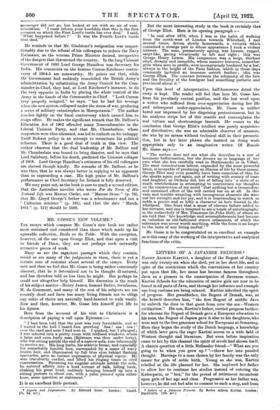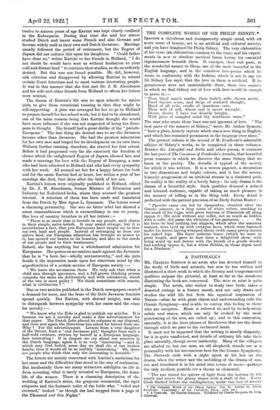LETTERS OF A JAVANESE PROCESS.*
• Aspects and Impressions. By Edmund Gone. London: Cassell. • Letters of a Javanese Princess. By Raden Adjeng Kartini. London:
Ranerr ADJENO KARTINI, a daughter of the Regent of Japara, was only twenty-six when she died, yet in her short life, and in spite of the restrictions which the conventions of her country put upon that life, her name has become famous throughout Java as a pioneer in the emancipation of Javanese women. Kartini Schools for the education of native girls are now to be found in all parts of Java, and through her influence and example age-long customs are being relaxed. Kartini inherited the spirit of progress. Her grandfather, the Regent of Demak, was, as she herself describes him, " the first Regent of middle Java to unlatch the door to that guest from over the sea—Western civilization." His son, Kartini's father, carried progress further, for whereas the Regent of Demak gave a European education to his sons, the Regent of Japara gave it also to his daughters, who were sent to the free grammar school for Europeans at Semarang. Here they began the study of the Dutch language, a knowledge of which later gave the eager Kartini access to a wide field of Western thought and literature. But even before inspiration came to her by this channel the spirit of revolt had shown itself. A chance question of a little Hollander friend—" What are you going to be when you grow up ? "—threw her into puzzled thought. Marriage to a man chosen by her family was the only career for girls of noble birth. Young as she was, Kartini rebelled at the life _planned for her. She implored her father to allow her to continue her studies instead of entering the liaboepatin, or " box," for the period of retirement incumbent upon girls of her age and class. Progressive as her father was, however, he did not feel able to consent to such a step, and from
twelve to sixteen years of age Kartini was kept closely confined in the Kaboepatin. During that time she and her sisters studied Dutch and learnt some French and also German and became widely reall in their own and Dutch literature. Marriage usually followed the period of retirement, but the Regent of Japara did not enforce this upon his daughters. " Could father have done so," writes Kartini to her friends in Holland, " I do not doubt he would have sent us without hesitation to your cold and distant land " to continue their studies, as she so ardently desired. But this was not found possible. He did, however, risk criticism and disapproval by allowing Kartini to attend certain Court functions and to meet various interesting people. It was in this manner that she first met Dr. J. H. Abendanon and his wife and other friends from Holland to whom her letters were written.
The dream of Kartini's life was to open schools for native girls, to give them vocational training so that they might be self-supporting. A plan was arranged for her to go to Holland to prepare herself for her school work, but it had to be abandoned, one of the main reasons being that Kartini thought she would have more influence if she was not suspected of being too Euro- pean in thought. She herself had a great dislike of the " pseudo- European." The last thing she desired was to see the Javanese become other than Javanese. She had the greatest admiration for her own race and longed for its development on its own lines.
Without further training, therefore, she started her first school.
Before it had progressed very far she exercised, the freedom of choice which the enlightened Regent of Japara allowed her, and made a marriage for love with the Regent of Rempang, a man who had been educated in Holland and who had every sympathy with her work. All seemed set fair for a happy future for both and for the cause Kartini had at heart, but within a year of her marriage she died, four days after the birth of her son. Kartini's letters were originally published in Holland, edited by Dr. J. H. Abendanon, former Minister of Education and Industry for Nederland-India, where they aroused the greatest interest. A selection of them has been made and translated from the Dutch by Miss Agnes L. Symmers. The letters reveal a charming personality. She was no bitter rebel but showed a
sweet reasonableness which is extraordinary in one so young. Her love of country breathes in all her letters :- "There is so much that is lovable in my people, such charm in their simple, naive beliefs. It may sound strange, but it is nevertheless a fact, that you Europeans have taught me to love my own land and people. Instead of estranging us from our native land, our European education has brought us nearer to it, has opened our hearts to its beauties, and also to the needs of our people and to their weaknesses."
Indeed, she has anything but a wholehearted admiration for
Europeans. She quotes an accusation made against the Javanese that he is " a born liar—wholly untrustworthy," and she puts beside it the impression made upon her observant mind by the superficialities of a certain section of European society :-
" We leave the accusation there. We only ask that when a child sins through ignorance, and a full-grown thinking person commits the same sin deliberately and with calculation, which of the two is most guilty ? We think sometimes with reason, what is civilization ?
One or two articles published in the Dutch newspapers created a demand for more, and the fame of the little Javanese feminist
spread quickly. But Kartini, with shrewd insight, was able to distinguish between sympathy with her cause and the craze for novelty :-
" We know why the Echo is glad to publish our articles. It is because we are a novelty and make a fine advertisement for that paper. The Dutch Laic placed its columns at my disposal, and time and again the Directress has asked for letters from me. Why ? For the advertisement. Letters from a true daughter of the Orient, from a real Javanese girl,' thoughts from such a half-wild creature, written by herself in a European language, how interesting ! If in despair we cry aloud our miseries in the Dutch language, again it is so very interesting '—and if, which may God forbid, some day we shall die of our broken hearts, then it would all be so terribly interesting.' Oh, there are people who think that only the interesting is desirable."- The letters are mainly concerned with Kartini's ambitions for
her cause and the difficulties that stood in the way of realization. But incidentally there are many attractive sidelights on life in
Java revealing, what is rarely revealed to Europeans, the home life of the women. There is a charming description of the wedding of Kartini's sister, the gorgeous ceremonial, the rigid
etiquette and the fantastic toilet of the bride who, " veiled and crowned," looked " as though she had stepped from a page of
the Thousand and One Nights."



































 Previous page
Previous page